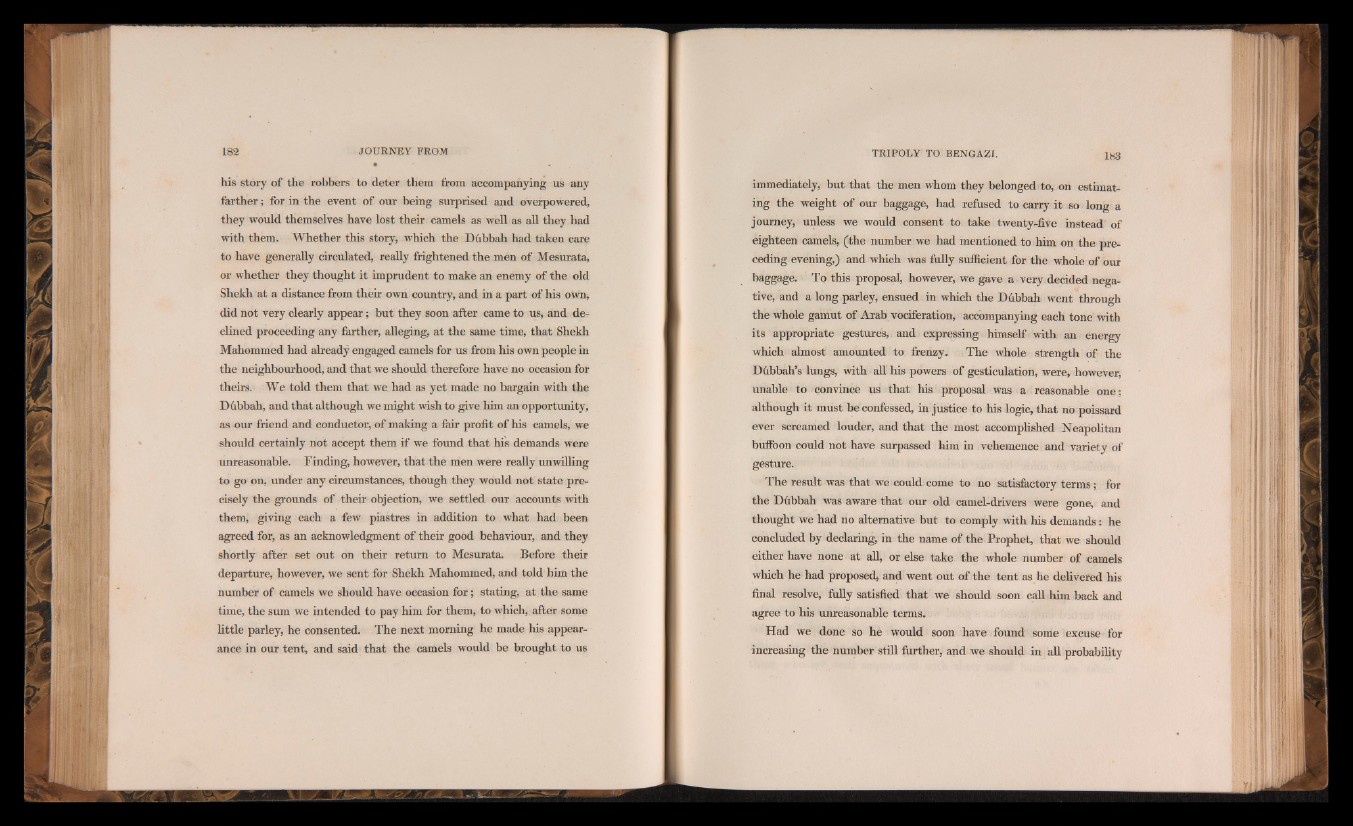
182 JO U R N EY FROM
•
his story of the robbers to deter them from accompanying us any
farther; for in the event of our being surprised and overpowered,
they would themselves have lost their camels as well as all they had
with them. Whether this story, which the Dhbbah had taken care
to have generally circulated, really frightened the men of Mesurata,
or whether they thought it imprudent to make an enemy of the old
Shekh at a distance from their own country, and in a part of his own,
did not very clearly appear; but they soon after came to us, and declined
proceeding any farther, alleging, at the same time, that Shekh
Mahommed had already engaged camels for us from his own people in
the neighbourhood, and that we should therefore have no occasion for
theirs. We told them that we had as yet made no bargain with the
Dfibbah, and that although we might wish to give him an opportunity,
as our friend and conductor, of making a fair profit of his camels, we
should certainly not accept them if we found that his demands were
unreasonable. Finding, however, that the men were really unwilling
to go on, under any circumstances, though they would not state precisely
the grounds of their objection, we settled our accounts with
them, giving each a few piastres in addition to what had been
agreed for, as an acknowledgment of their good behaviour, and they
shortly after set out on their return to Mesurata. Before their
departure, however, we sent for Shekh Mahommed, and told him the
number of camels we should have occasion for; stating, at the same
time, the sum we intended to pay him for them, to which, after some
little parley, he consented. The next morning he made his appearance
in our tent, and said that the camels would be brought to us
immediately, but that the men whom they belonged to, on estimating
the weight of our baggage, had refused to carry it so long a
journey, unless we would consent to take twenty-five instead of
eighteen camels, (the number we had mentioned to him on the preceding
evening,) and which was frilly sufficient for the whole of our
baggage. To this proposal, however, we gave a very decided negative,
and a long parley, ensued. in which the Dfibbah went through
the whole gamut of Arab vociferation, accompanying each tone with
its appropriate gestures, and expressing himself -with an energy
which almost amounted to frenzy. The whole strength of the
Diibbah’s lungs, with ah his powers of gesticulation, were, however,
unable to convince us that his proposal was a reasonable one;
although it must be confessed, in justice to his logic, that no poissard
ever screamed louder, and that the most accomplished Neapolitan
buffoon could not have surpassed him in vehemence and variety of
gesture.
The result was that we could, come to no satisfactory terms; for
the Dfrbbah was aware that our old camel-drivers were gone, and
thought we had no alternative but to comply with his demands: he
concluded by declaring, in the name of the Prophet, that we should
either have none at all, or else take the whole number of camels
which he had proposed, and went out of the tent as he delivered his
final resolve, fully satisfied that we should soon call him back and
agree to his unreasonable terms.
Had we done so he would soon have found some excuse for
increasing the number still further, and we should in all probability